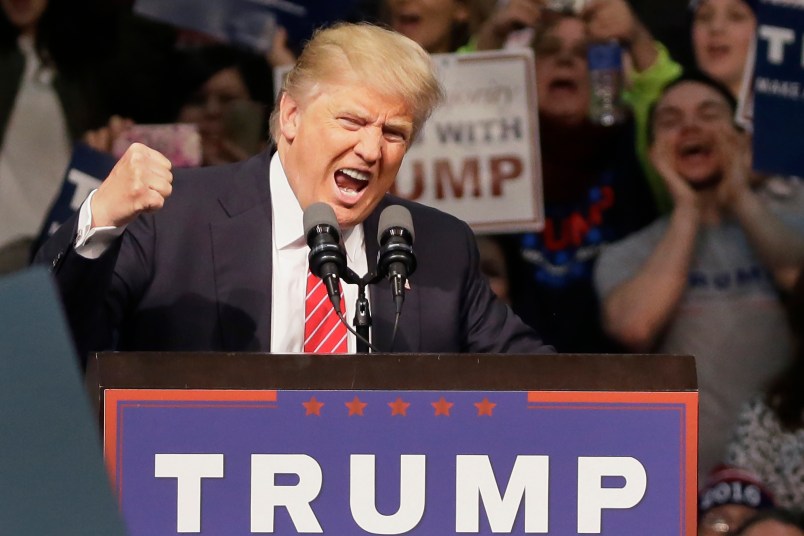In my series of impromptu essays about Trump and Trumpism I’ve repeatedly returned to the topic of ‘dominance politics‘ and the way it informs virtually everything about Trump’s campaign. So far I’ve discussed it mainly in the context of domestic, electoral politics. That’s the framework in which I usually think about it. But since Trump will almost certainly be the Republican nominee and thus possibly become President, it’s important to think through the implications abroad as well.
Because Trump (supposedly and perhaps did) opposed the Iraq War and has been interested in making a “deal” between the Israelis and Palestinians I know many people assume that whatever other nonsense he might bring to the White House, Trump would be a welcome change from the militaristic unilateralism of the Bush Republican party and the politics of perpetual war which, for some at least, continued through the Obama years.
Even I’ve of wondered about this. Repeatedly in Republican debates, where it’s anything but an applause line, Trump has said he’d like to try to negotiate a settlement between the Israelis and the Palestinians. I was actually talking to a writer today about a longform piece I’m commissioning on what Israel hawks in the GOP make of all this and how they plan to influence Trump. There is a friend of mine whose politics are greatly informed, driven by revulsion against the foreign policy of the Bush era. He actually thinks Trump might be better than Clinton because he says he’ll be focused on deal-making abroad, perhaps some sort of rapprochement with Russia, while Clinton is still at least somewhat in the thrall of the saner wing of DC neoconservatives.
Whatever you think of Clinton’s foreign policy thinking, this is profoundly naive. No one whose basic mode of viewing people and the world is so deeply driven by dominance politics, with all that entails, is going to preside over a more peaceful, less conflict-ridden or safer world. Set aside that Trump is attracting the most xenophobic and militaristic elements of the American political nation. His language has a recurrent focus on foreigners and foreign countries ‘laughing at us’, ‘humiliating us’, ‘beating us.’ This is not the prism through which peaceful coexistence, even undergirded by military strength, is built. It’s a language of revenge.
As I’ve written before, Trump’s brand of dominance politics is built on “a series of symbols and actions that mark the dominating from the dominated.” His attitude toward other countries seems quite similar. In the Trump foreign policy worldview, we, the United States, are the unmanned losers that guys like Trump stomp and humiliate. We’ve become a nation of Jebs in need of a Trump to lead us. We need a Trump-type president to move back to dominating rather than being dominated. To imagine that this leads to a judicious, even-keeled foreign policy is the height of delusion.
Consider Trump’s infamous and ridiculous US-Mexico border wall – that Mexico is going to pay for. This is such a nonsensical proposition on so many fronts that few look at it seriously. But here’s the thing: Mexico paying for the wall isn’t a matter of cost-saving or fairness or equity; it’s a symbol of humiliation. Argue and he’ll make it ten feet taller, as he’s said in debate after debate. It’s the geopolitical analog to the classic scene in Godfather II where Michael tells Sen. Geary that not only will he not pay the bribe he demands for the Nevada gaming license but that he expects Geary to pay for the Corleone family’s license out of his own pocket. “Senator? You can have my answer now, if you like. My final offer is this: nothing. Not even the fee for the gaming license, which I would appreciate if you would put up personally.”
It’s akin to a punitive war indemnity, only we haven’t had a war.
Weak countries can revel in their victimization and beat the domestic political drum to demand respect from other states. Often this captures the reality of their international position. In any case the costs to the international system are limited because they are weak powers. There’s not much they can do other than provide a psychic balm for their powerlessness. It is an altogether different matter, as we’ve seen on many occasions through history, when countries that are in fact extremely powerful, dominant powers fall under the spell of fantasies of their own weakness and victimization. Because … they’re powerful. They can do great harm, often in the end to themselves.
We’re already hearing Trump talk about pulling out of NATO, withdrawing military support from countries like Saudi Arabia or Japan and Korea. Whether or not you agree with them, there are strong, considered arguments why the US should stop underwriting so much of the defense of regional allies in places like East Asia and adopt a more collaborative defense strategy. But this isn’t what Trump is talking about. This a conversation and getting back at countries who’ve ‘humiliated’ us, ‘laughed’ at us.
He has of course also taken to casually discussing using nuclear weapons in what amount to urban warfare situations.
Of course, we might speculate that Trump in power would be very different from Trump getting power. Perhaps he would focus on new ‘deals’ with other great powers, based on mutual interests, but more safely guarding US interests. But everything we’ve seen from Trump says the opposite. As I noted in that crazy weekend two weeks ago where the canceled event in Chicago was followed by the protester rushing the stage in Dayton, whatever his intentions, Trump seems unable or uninterested in pivoting toward conciliation when his political interests clearly point in that direction. The draw of aggression seems too strong and instinctive. Everything we’ve seen tells us that Trump will be the same person on the world stage as he’s been on the campaign trail.






